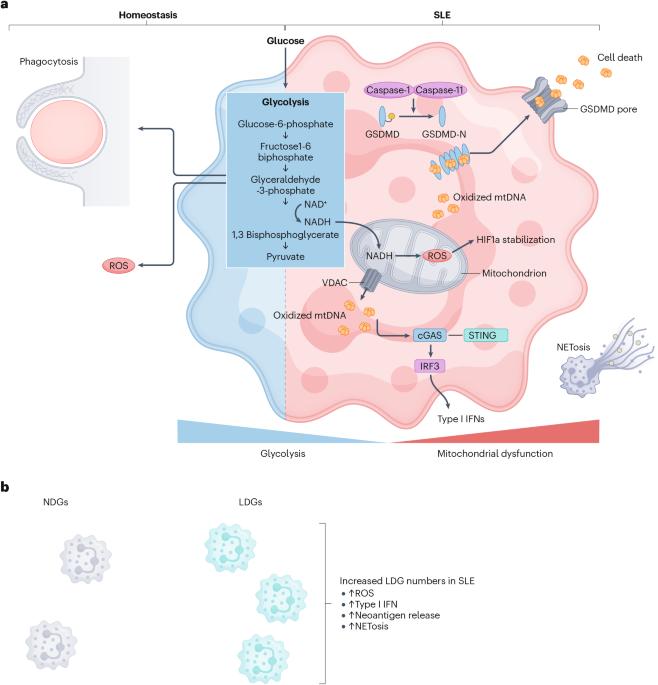Immunometabolism in systemic lupus erythematosus
IF 32.7
1区 医学
Q1 RHEUMATOLOGY
引用次数: 0
Abstract
Systemic lupus erythematosus (SLE) is a multifaceted autoimmune disorder characterized by chronic inflammation, tissue damage, accelerated cardiovascular disease and the synthesis of autoantibodies that target nucleic acids and nuclear protein complexes. Emerging evidence underscores the key role of immune metabolic dysregulation in SLE, revealing how metabolic reprogramming during immune cell activation influences disease development and progression. Alterations in key metabolic pathways such as glycolysis and oxidative phosphorylation profoundly affect the activation, differentiation and function of B and T cells, monocytes, neutrophils and other immune cells, driving inflammation and tissue injury. This Review synthesizes current findings on immune cell metabolism in animal models of lupus and in patients with SLE, highlighting the interplay of metabolic disturbances, mitochondrial dysfunction and disease pathogenesis. Furthermore, it explores the potential of targeting metabolic pathways as therapeutic strategies to mitigate organ damage and improve outcomes in SLE. Systemic lupus erythematosus is characterized by altered metabolic profiles and changes in immune cell metabolism. The authors review these changes and discuss how interventions that target metabolic processes might provide treatment options in systemic lupus erythematosus.


系统性红斑狼疮的免疫代谢
系统性红斑狼疮(SLE)是一种以慢性炎症、组织损伤、心血管疾病加速和靶向核酸和核蛋白复合物的自身抗体合成为特征的多层面自身免疫性疾病。新出现的证据强调了免疫代谢失调在SLE中的关键作用,揭示了免疫细胞激活过程中的代谢重编程如何影响疾病的发生和进展。糖酵解和氧化磷酸化等关键代谢途径的改变深刻影响B细胞和T细胞、单核细胞、中性粒细胞等免疫细胞的活化、分化和功能,从而引发炎症和组织损伤。这篇综述综合了狼疮动物模型和SLE患者免疫细胞代谢的最新发现,强调了代谢紊乱、线粒体功能障碍和疾病发病机制的相互作用。此外,它还探讨了靶向代谢途径作为缓解器官损伤和改善SLE预后的治疗策略的潜力。
本文章由计算机程序翻译,如有差异,请以英文原文为准。
求助全文
约1分钟内获得全文
求助全文
来源期刊

Nature Reviews Rheumatology
医学-风湿病学
CiteScore
29.90
自引率
0.90%
发文量
137
审稿时长
6-12 weeks
期刊介绍:
Nature Reviews Rheumatology is part of the Nature Reviews portfolio of journals. The journal scope covers the entire spectrum of rheumatology research. We ensure that our articles are accessible to the widest possible audience.
 求助内容:
求助内容: 应助结果提醒方式:
应助结果提醒方式:


